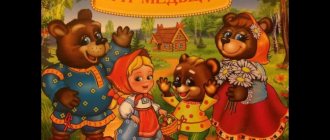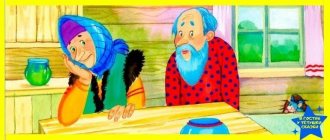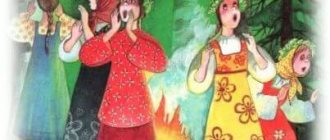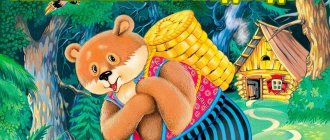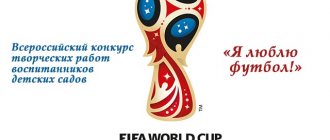Literary leisure in the middle group “Visiting Grandfather Korney”
Literary leisure based on the fairy tales of K. I. Chukovsky:
"Visiting Grandfather Korney"
Prepared by teacher: Balakhonova L.V.
2019
Goals
:
- Recall with children the names and contents of the works of K.I. Chukovsky, with which they became acquainted, awaken in children the joy of meeting their favorite fairy-tale characters, and develop their imagination.
- To develop the ability to determine the content of literary works from excerpts from books and illustrations.
- Encourage them to “help” the heroes of these works - to recite familiar poems with them, using intonational means of expressive speech.
Preliminary work:
reading fairy tales by K.I. Chukovsky “Telephone”, “Doctor Aibolit”, “Fly-Tsokotukha”, “Fedorino’s grief”.
Progress:
Educator.
Guys, do you believe in miracles?
Children:
Yes!
Educator.
A real miracle happened in our group this morning!
- Do you want to see?
Children:
Yes!
Educator.
Then close your eyes and don’t peek
(the children close their eyes, the teacher takes out the Queen book).
– Now open your eyes and look. Did you see a miracle? See, this is Queen Book, how beautiful she is? Do you like her? (Yes).
Let's open it and take a look at the first page. What's on the first page? Here, guys, are the rules for handling the book.
Children:
- Take books with clean hands.
- Books cannot be torn.
- Books must not be crushed.
- You can't draw on books.
- You can't bend corners.
Educator.
Well done boys! Know how to handle a book correctly.
– But the Queen of Books tells us one more golden rule that we must remember: “Books love silence,”
therefore, you cannot talk loudly, make noise or play around, you must be attentive, if you want to say or answer something, you must raise your hand.
Everyone, remember this rule? (Yes).
– How should we behave?
Children:
quiet.
Educator.
Now we can look at the next page, what's there?
- Who is this, guys? (Korney Ivanovich Chukovsky).
– Today the Queen of Books invites us to visit your most beloved writer, whom both adults and children love, Korney Ivanovich Chukovsky.
- Grandfather Korney invites all the children to visit! But he is especially glad to invite such children, who know how to listen to fairy tales or like to read them. - Do you want to visit? (Yes).
Then, let's go.
Children pass and sit on chairs).
On the table is a portrait of K.I. Chukovsky and books with his works.
Educator.
So, we came to visit. Here we are already waiting for books written by K.I. Chukovsky.
Educator.
Today, with the Queen's book, we will remember the fairy tales of K.I. Chukovsky.
– Guys, do you remember how K.I. Chukovsky started writing fairy tales? (No).
“Then I’ll remind you.”
– Korney Ivanovich Chukovsky lived a long time ago, when your grandparents were as small as you are now.
He had four children: two daughters and two sons. He loved them very much, often played hide-and-seek and tag with them, swam in the sea with them, took them on boat rides, and built fairy-tale sand castles with the children. They lived amicably and cheerfully.
But one day a misfortune happened. One of his sons (a little boy) became seriously ill. He had a high fever and a severe headache. The boy did not eat anything, could not sleep, and only cried.
Chukovsky felt very sorry for his son, he wanted to calm him down, and he began to invent and tell him a fairy tale as he went. The boy liked the fairy tale, he stopped crying, listened carefully and finally fell asleep, and after a few days he completely recovered.
After this incident, Korney Ivanovich Chukovsky began to compose fairy tales. And he came up with many fairy tales that children and adults know and love well.
- Do you like fairy tales?
Children:
Yes.
Educator.
What tales of K.I. Chukovsky do you know?
Children.
“Telephone”, “Doctor Aibolit”, “Moidodyr”, “Fly-Tsokotukha”, “Fedorino’s grief”.
Educator.
Well done, you know a lot of fairy tales.
– Let’s see what’s on the next page of the Queen’s book (turns the page, on it is an excerpt from “Moidodyr”).
“The blanket ran away, the sheet flew away, and the pillow, like a frog, jumped away from me. I am for a candle, A candle - in the stove! I’m for a book, but I’m running and jumping under the bed!” - Guys, did you find out what fairy tale we are talking about?
Children.
“Moidodyr”.
Educator.
Who will show me this book, where it is?
(One of the children shows “Moidodyr” among the books on display).
- How did you guess? (Moidodyr is drawn on it.)
- That's right guys, from the illustration on the cover of the book we can determine who or what this book is about, the drawing helped us.
– Who is this fairy tale about? (Children's answers.)
– Korney Ivanovich Chukovsky really didn’t like children who didn’t wash their hands or wash themselves. He wrote a fairy tale about such dirty people, which is called “Moidodyr”
– What’s on the next page of the Queen’s book?
- There are riddles here, guys. You need to choose any number, I will tell you a riddle under this number. If you guess right, a window will open.
- He sleeps in a den in winter under a huge pine tree, and when spring comes he wakes up from sleep (Bear).
- A cunning cheat Red head A fluffy tail - beauty And her name is... (Fox).
- Here are the needles and pins crawling out from under the bench. They look at me, they want milk (Hedgehog).
- A ball of fluff. A long ear. Jumps deftly Loves carrots (Hare).
Educator.
Well done boys. You have completed the task. Look, a guest has come to us. Do you know who this is?
Children.
This is Fyodor’s grandmother from the fairy tale “Fedorino’s Grief.”
Educator.
What does this fairy tale teach us?
Children.
Be neat, clean, take care of the dishes, wash them.
Dramatization of an excerpt from the fairy tale “Fedorino’s grief.”
Educator.
Let's take a look at the next page of the Queen of the Book and see what else she has in store for us.
- And here is the game “Say the Word.” I will read the beginning of the line, and you continue.
Good doctor……….(Aibolit)! He is under the tree ………..(sits) Come to him for treatment. Both the cow and …………..(she-wolf). And a bug, and ………………(worm), And a bear! He will heal everyone, he will heal Good…………………(Dr. Aibolit)!
Educator.
Did you enjoy playing? What fairy tale are these lines from?
Children.
Yes! From the fairy tale “Doctor Aibolit”
PHYSMINUTE
Dr. Aibolit
. Hello. Did you call me? Should I treat you?
Educator.
Let's stand in a circle and show Dr. Aibolit that we are healthy, there is no need to treat us.
You don’t need to treat us, Good Doctor Aibolit. We will run and walk, We will gain strength. Our tummies don’t hurt like poor hippos. We will stretch our hands to the sun, And then we will sit down on the grass. Like eagles we fly, we soar, we look in all directions, where is Africa - the country? Maybe they need help there? Together with Chita we will jump, like a cheerful, ringing ball. Skok-skok, skok-skok, Don't cling to a twig. Children will walk through the grass in a friendly manner towards the poor ostrich chicks. They will raise their legs and walk through the thick grass. We helped everyone and became strong ourselves.
“That’s how strong and healthy we are.” Sit down, guys.
Game situation “At an appointment with Doctor Aibolit”
(children with their favorite toys come to the doctor to check their health)
Educator.
What's on the next page of the Queen's book? (Phone and bear)
- Do you want to revive her? (Yes).
-I will turn you into wizards now. Close your eyes and don't peek. Make a wish and say it to yourself so that the picture comes to life (music plays and we turn the child into a Bear. When the music ends, the children open their eyes).
- Guys, our picture has come to life.
Dramatization of an excerpt from the fairy tale “Telephone”
Educator.
Guys, tell me, what fairy tale did this heroine come to us from?
Today I am waiting for a gift, Today I am the birthday girl. I went to the market, I bought a samovar. I’ll treat my friends to tea, let them come in the evening.
Children.
From the fairy tale “Tsokotukha Fly”.
Educator.
Guys, Korney Ivanovich loved children very much, he often came to the children to read his funny poems and fairy tales. Guys, look how many fairy tales K.I. wrote for us. Let’s name them again (they list them).
- Why do you guys like these fairy tales?
Children.
Because they are kind, funny, interesting, instructive.
Educator.
What do fairy tales teach us?
Children.
Be kind, neat, polite.
Educator.
Thanks to K.I. Chukovsky for the wonderful fairy tales. And now the Tsokotukha Fly invites us to visit for tea.
(Tea drinking and a sweet table are organized for children)
4
MAGAZINE Preschooler.RF
Literary and speech activities in our kindergarten.Literary and speech activities in our kindergarten are held in all age groups. They are held once a month in the afternoon.
“Rhetoric + Theater” has been created on the basis of our kindergarten ; the pupils of this circle perform theatrical performances for children of younger groups. Based on Russian folk tales. “Kolobok” , “Teremok” , “Turnip” etc. T. P
Starting from the middle group, we use literary and speech leisure in the form of a quest game. Such as “Miracles in a fairy tale land” , “On the roads of fairy tales” , “Let's help the heroes from a fairy tale”
Also, during literary and speech leisure, children, together with their parents and kindergarten teachers, develop newspapers; the pupils really loved making baby books in our kindergarten. After all, this interesting activity captivates all kindergarten students. Pupils of older groups make words from letters and paste them into a little book. They independently design the publication, draw fairy tale characters, come up with continuations of fairy tales, or invent their own fairy tales.
Literary and speech leisure activities evaluate the speech development of children, to understand how all mental processes are activated, how moral qualities are formed, how cognitive processes, creativity, and intelligence of the child develop.
Also in our work we use a variety of tasks that we use in our work, for example: “Find out a fairy tale or story by a passage, illustration, objects, by a character in a story or fairy tale. “How do fairy tales differ from other literary works ? “What proverbs are found in fairy tales”
Our kindergarten also hosts speech festivals; we dedicate them to the work of children's writers. Speech festivals unite different types of arts - painting, literature, music.
In our kindergarten there are a lot of scenarios for such holidays. “My favorite toys” (based on the work of A. Barto), “Living Hat” (based on the work of N. Nosov), the holiday of “True Friends” , the holiday of “Russian folk tales” .
The main task of our holidays is to improve the speech of preschoolers and develop creative abilities.
Our students love to take part in preparations for the holidays. Pupils show great interest in acting out skits and love to recite poems. They take great pleasure in making up fairy tales.
Also in our kindergarten there are intellectual and speech games in the form of quizzes, competitions, tournaments, and Olympiads.
We also have original leisure scenarios for pupils of the preparatory school group “Magic Country” , “On the Path to Fairy-tale Heroes” .
After all, such games are important for the development of a preschooler’s intelligence. We hold intellectual competitions between pupils of children of the same age, as well as between kindergartens.
In our kindergarten we attach special importance to holidays with the participation of parents and children. We have a lot of holidays with our parents, for example: “Mom’s Tales” , “In the Country of Summer Residents and Gardeners” , “Chocolate Day” , “Mom Dad I’m My Friendly Family” . Holidays with the participation of parents show that there is an atmosphere of mutual understanding, joint creativity, and friendship.
Our creative work helped develop preschoolers’ motivation for knowledge and creativity, and the formation of a positive image. We have created all the necessary conditions for meaningful leisure time for children in kindergarten, and the role of parents in the upbringing and development of preschoolers has increased significantly.
| Next > |
Literary evening with parents for children of the senior group “My favorite book”
Scenario of literary leisure in the senior group “My favorite book”
(based on the works of K.I. Chukovsky, S.Ya. Marshak, S.V. Mikhalkov, on the Most Reverend Mother’s Day.
Purpose of the event: • Systematization and consolidation of children’s knowledge about the read literary works of K.I. Chukovsky, S.Ya. Marshak, S. .V. Mikhalkova Main tasks: • Develop dialogical speech, speech hearing, intonation expressiveness • Form creative imagination • Instill in children an interest in books • Cultivate in children and parents goodwill and responsiveness to each other • Create a warm moral climate between mothers and children; • Encourage the creative abilities of mothers and preschoolers. Artistic and technical design: • books by K. Chukovsky, S. Marshak, S. Mikhalkov. • multimedia presentation on the topic “My favorite book” • use of decorations, attributes for staging fairy tales and poems , • selection of musical accompaniment.Progress
of the event
Children stand in the center of the group.
Educator: Today we have an unusual meeting. We have gathered today for our literary evening to discuss how much and often you read books to children. We decided to dedicate our meeting to the closest person in the world – my mother. Mom is the first word a person utters; with her he takes his first step. How much patience, care, tireless work and love is required from a mother! She is ready to sacrifice the most precious things for the sake of her children, for the sake of their happiness. We would really like today’s meeting to bring you joy, to take you at least a little away from everyday worries, so that you feel how precious your attention is to the children. You ask: “Why do children need fairy tales?” For many centuries, children listened to Russian folk tales. They were told by grandmothers, mothers and nannies. Now parents and grandmothers have forgotten how to tell fairy tales, but have they not yet forgotten how to read? A child who has listened to fairy tales since childhood grows up to be healthy at heart. This is the only way a child can learn the moral categories contained in the book. Therefore, read aloud to your children, so that in the future your child will act as good heroes of works of fiction do. Educator: - Who writes books? (writer, poet). — What parts does the book consist of? (cover, binding, page, drawing). Educator: What tales of K. I. Chukovsky do you know? Name them. Children. “Telephone”, “Doctor Aibolit”, “Moidodyr”, “Fly-Tsokotukha”, “Fedorino’s grief”. Educator: Now we will hold a competition for the best expert on poetry - fairy tales by K.I. Chukovsky. Guess where these lines come from? 1. Early in the morning at dawn, little mice, and kittens, and ducklings, and bugs and spiders wash themselves. You alone did not wash your face and were left dirty, and both your stockings and shoes ran away from being dirty. (“Moidodyr”) 2. And then the herons called: “Please send some drops: We have eaten too much of frogs today and our stomachs hurt. (“Telephone”) 3. The bears were riding a bicycle, and behind them was a cat backwards. And behind him are mosquitoes in a balloon. (“Cockroach”) 4. And the mountains stand in front of him on the way, and he begins to crawl through the mountains. And the mountains are getting higher, and the mountains are getting steeper, And the mountains are going under the very clouds! “Oh, if I don’t get there, if I disappear on the way, what will happen to them, to the sick, to my forest animals?” (“Aibolit”) 5. And in the big river the Crocodile lies, And in his teeth there is no fire burning - The sun is red, the sun is stolen. (Stolen sun) 6. And then the crocodile called and asked with tears: “My dear, good one, Send me galoshes. And for me, and for my wife, and for Totosha” (Telephone) 7. For a long time, the Crocodile put out the blue sea. Pies and pancakes And dried mushrooms (Confusion) Slide No. 1 Karney Chukovsky
Chukovsky’s real name is Nikolai Korneychukov.
He was born in St. Petersburg in 1882. Nikolai really wanted to become an educated person: he read a lot, learned English on his own, and became a journalist. He got up very early, as soon as the sun rose, and immediately got to work. In spring and summer I dug in the garden or in the flower garden in front of the house, in winter I cleared the paths from the snow that had fallen overnight. After working for several hours, he went for a walk. He walked surprisingly easily and quickly, sometimes he even started racing with the kids he met while walking. It was to these kids that he dedicated his books. He had four children: two daughters and two sons. He loved them very much, often played hide-and-seek and tag with them, swam in the sea with them, took them on boat rides, and built fairy-tale sand castles with the children. They lived amicably and cheerfully. But one day a misfortune happened. One of his sons (a little boy) became seriously ill. He had a high fever and a severe headache. The boy did not eat anything, could not sleep, and only cried. Chukovsky felt very sorry for his son, he wanted to calm him down, and he began to invent and tell him a fairy tale as he went. The boy liked the fairy tale, he stopped crying, listened carefully and finally fell asleep, and after a few days he completely recovered. After this incident, Korney Ivanovich Chukovsky began to compose fairy tales. And he came up with many fairy tales that children and adults know and love well. Educator: Today we will remember another author. His books are loved by many generations of readers. (Knock on the door.) Child: Who is knocking on my door, with a thick bag on his belt, with the number 5 on a copper plaque, in a blue uniform cap? Children: It’s him, it’s him... - Leningrad postman. (the postman appears). Postman: Which book did I come from? Who is author? (Marshak “Mail”). Postman: At seven o'clock I started business. At 10 - the bag lost weight. And it came to you guys. Here is the envelope and parcel post. If you like riddles, you will find answers in it. Riddle: Not a tree, but with leaves, Not a shirt, but sewn. Not a person, but telling? (Book). The postman opens the parcel and takes out the book “Mail” by Marshak. Gives to the presenter Educator: Thank you, postman, for the wonderful book S.Ya. Marshak. Therefore, we will now talk to you about his other works. (The postman sits down) Educator: Guys, what works do you and I know by this famous author? (children name the works) Slide No. 2
S. Marshak.
Samuil Yakovlevich Marshak (1887-1964) was born in Voronezh. In his youth he moved to St. Petersburg. He studied at a gymnasium (school) and his teachers considered him a child prodigy. A few years later, Marshak left for England to complete his education at the University of London. During the holidays, he traveled a lot around England and was already working on translations of English folk songs. After finishing his studies he returned to his homeland. Marshak participated in the organization of orphanages and the creation of a children's theater, where his work as a children's writer began. He wrote the first fairy tales in verse: “Fire”, “Mail”, and translated English children's songs. Among Marshak’s works, fairy tale plays are especially popular: “Twelve Months”, “Smart Things”, “Cat’s House”. But the most beloved and understandable to every child and every mother is “The Tale of a Stupid Mouse.” I propose to show this fairy tale to our mothers. A dramatization of the work “The Tale of a Stupid Mouse” by S.Ya. Marshak. Physical education for a minute. Educator: We really liked the way you guys performed. — All children love to play with a ball, so Marshak wrote the poem “Ball.” Do you want to play? Children go out to play with balls in their hands. Educator: And I want to continue our evening with these lines: Everyone knows his fables and poems. You won’t read this anywhere, only in Mikhalkov’s books Slide No. 3
Sergei Mikhalkov.
Sergei Vladimirovich Mikhalkov - a wonderful children's writer - Born on March 13, 1913 in Moscow. And soon, in March, he would have turned 105 years old. Sergei Vladimirovich wrote his first poem at the age of 9. At the age of 15, his works were already published in famous newspapers and magazines of the country. But after the publication of his poem “Uncle Styopa,” Mikhalkov truly became famous. In addition to poetry and fables, Sergei Vladimirovich wrote children's songs and scripts for cartoons. The anthem of the Russian Federation was also composed by Mikhalkov. The famous lines on the granite slab of the Eternal Flame near the Kremlin wall: “Your name is unknown, your feat is immortal,” also belong to Mikhalkov. His works still bring joy to everyone. Not only children, but also their parents and grandparents know the characters from the works of Sergei Mikhalkov. Why do we love his work? Yes, because his works are kind, interesting and instructive. Let's listen to an excerpt from this work. (Staging of the work “What do you have?”) Educator: - Let’s count, guys? Staging of the work “Kittens” 1st child: Listen guys, I want to tell you: We had kittens - there are exactly five of them. 2nd child: We decided, we wondered - What should we call the kittens? Finally we named them: ONE, TWO, THREE, FOUR, FIVE. 3rd child : ONE - the kitten is the whitest, TWO - the kitten is the bravest, THREE - the kitten is the smartest, AND FOUR - the noisiest. 4th child: FIVE is similar to THREE and TWO - Same tail and head, Same spot on the back, Also sleeps all day in a basket. 5th child: Our kittens are good - ONE, TWO, THREE, FOUR, FIVE! Come to us, guys, Look and count! Educator: And now a creative competition for your mothers! And we invite you to have a little fun. Moms and dads tell their children fairy tales. And today, we invite you, dear mothers, to show you a fairy tale. (they dramatize a fairy tale on the go with a pantomime. Parents are given notes with roles: kitten, magpies 2, rooster, hens 2-3, puppy. First acquaintance with the street. Today the kitten left the house for the first time. It was a warm summer morning, the sun scattered its rays everywhere sides. The kitten sat down on the porch and began squinting in the sun. Suddenly his attention was attracted by magpies that flew in and sat on the fence. The kitten slowly crawled off the porch and began to sneak up on the birds. The magpies chirped incessantly. The kitten jumped high, but the magpies flew away. Nothing. it didn't work out. The kitten began to look around in search of new adventures. A light breeze was blowing and pushed a piece of paper along the ground. The piece of paper rustled loudly. The kitten grabbed it, scratched it a little, bit it and, not finding anything interesting in it, let it go. The piece of paper flew away, driven by the wind . And then the kitten saw a rooster. Raising his legs high, he walked importantly through the yard. Then he stopped, flapped his wings and sang his sonorous song. Chickens rushed to the rooster from all sides. Without thinking twice, the kitten rushed into the flock and grabbed one hen by the tail. But she pecked the kitten so painfully that he screamed a heart-rending cry and ran back to the porch. Here a new danger awaited him. The neighbor's puppy, falling on its front paws, barked loudly at the kitten, and then tried to bite it. The kitten hissed loudly in response, released its claws and hit the puppy on the nose. The puppy ran away, whining pitifully. The kitten felt like a winner. He began to lick the wound caused by the chicken. Then he scratched his hind paw behind his ear, stretched out on the porch at his full height and fell asleep. We don’t know what he was dreaming about, but for some reason he kept twitching his paw and moving his mustache in his sleep. Thus ended the kitten’s first acquaintance with the street. Educator: You passed the test with honor. And I want to tell you: Take care of each other! Forget the fuss. And in a moment of leisure, stay close together! Love, health, happiness, mutual understanding in your families. — The children made little books with their own hands based on the works of their favorite writers. And now they will give it to their mothers. Well, mothers came to visit us not empty-handed, but with delicious pies. It's time for tea. Tea relieves fatigue and improves your mood! Educator: I hope our guests enjoyed today's meeting.
We recommend watching:
Leisure scenario in kindergarten in the senior group “Greetings Day” Summary of thematic leisure in the senior group on the theme “Sister Bird” Leisure scenario “Journey through Pushkin’s fairy tales” for children of senior preschool age Sports leisure in the senior group. Scenario
Similar articles:
Leisure and entertainment in kindergarten in the senior group
Conversation in the senior group of kindergarten on the topic: How people use leather and wood
Summary of a lesson on cognitive development in the senior group. Table manners
Summary of a lesson on cognitive development in the senior group. Rules of life
Lesson notes for the senior group of kindergarten
